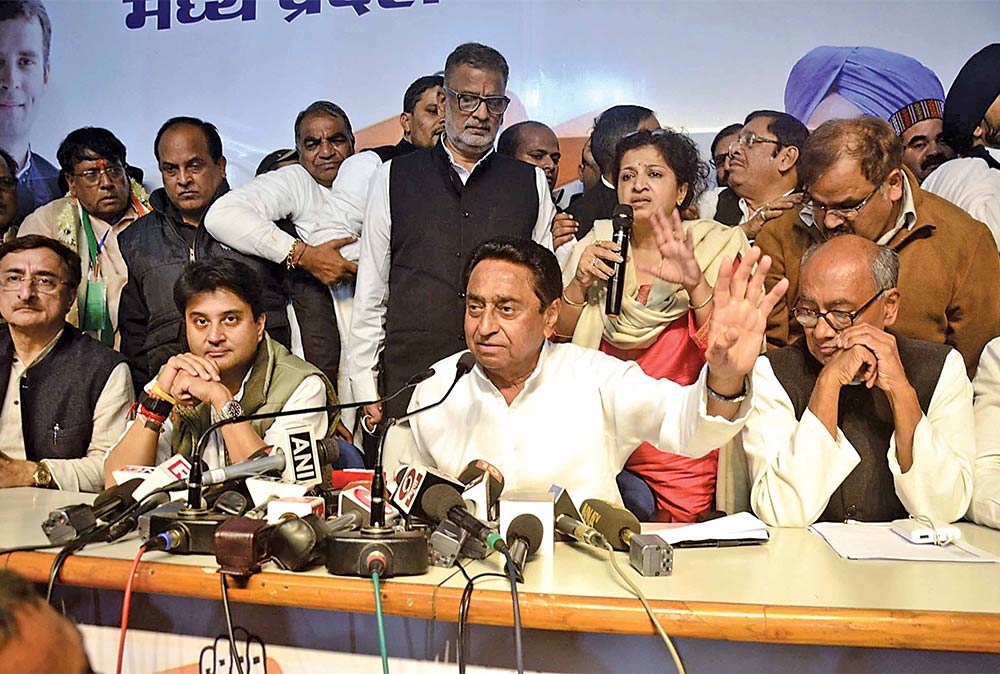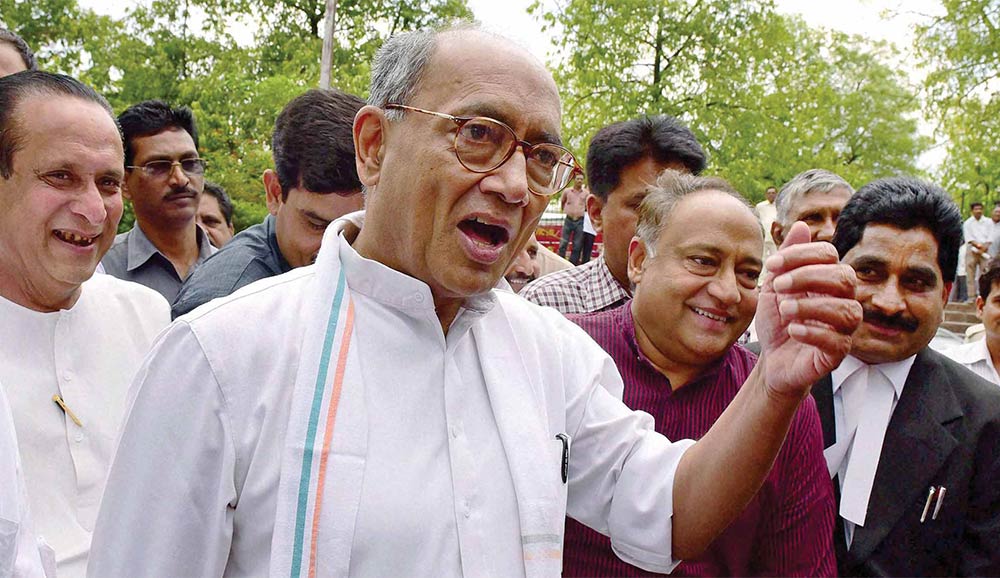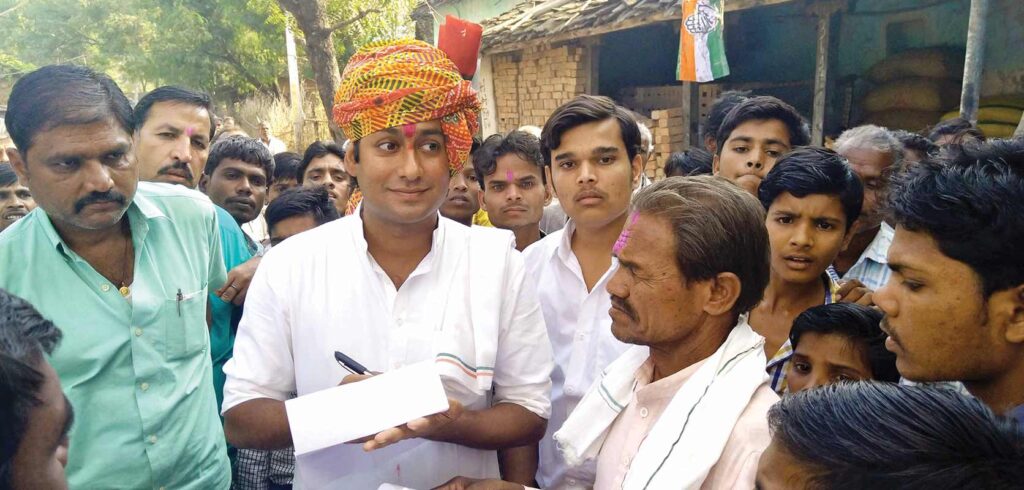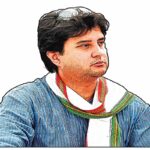THE three-month old Kamal Nath government has the dubious distinction of making Congress President Rahul Gandhi look like a fraud. If this sounds scandalous and unbelievable, check the records of the Madhya Pradesh assembly proceedings.
This government has virtually admitted that its vociferous attacks on the previous Shivraj Singh Chouhan government on alleged corruption in Simhastha 2016 and massive tree-plantation along the Narmada riverbank were based on falsehood. It has falsified its own allegations made ahead of the assembly election.
On February 18, state’s Home Minister Bala Bachchan justified police firing on farmers in Mandsaur district on June 6, 2017 which killed six farmers. Replying to a BJP member’s question, the minister said police had to resort to firing “in self defence, to protect public properties and to quell the violent mob.”
The Congress agitated against the wanton police firing which had led to massive uproar nationwide. Rahul Gandhi visited Mandsaur on the first anniversary of the police firing on farmers and announced that farmers’ loans would be waived within 10 days if the Congress came to power. The police firing was a major part of Congress campaign for the assembly elections. The party had promised to get the Mandsaur incident thoroughly probed by a judicial commission. Within two months of coming to power, the government justified the firing.
Digvijay Singh’s son and Urban Development Minister Jaivardhan Singh added to the government’s woes by giving a clean chit in the assembly to the previous government over the charges of massive corruption in Simhastha three years ago. The huge religious congregation at Ujjain in April 2016 had been marred with allegations of massive corruption worth hundreds of crores. The Congress relentlessly attacked the Shivraj Singh government for hugely inflated rates at which items ranging from earthen pitchers to air-conditioners were purchased for the Simhastha which the then government showcased as a Rs. 5,000-crore extravaganza.
Not to be left behind in landing his own government in the soup, Forest Minister Umang Singhar exonerated the previous government from corruption charges over the controversial tree plantation programme along the river Narmada. The Shivraj Singh government had announced to create a world record by planting over 6.6 crore saplings along the holy river. In 2017, Chouhan had made a parikrama of river Narmada. His pilgrimage was followed by plantation drive. Later Digvijaya Singh made a parikrama of the holy river and claimed that there was no trace of the saplings and the huge amount spent on the plantation had been misappropriated
The Congress and a section of the saint community also raised a stink over the government’s claim and alleged corruption in the drive.
The government’s mortifying flip-flop drew massive criticism in the media. Senior Congress leader Digvijay Singh took the ministers to task and openly expressed his displeasure.
Following his scolding, the ministers took U-turn one by one. The Home Minister denied giving clean chit to the BJP government over the Mandsaur firing, adding he was getting the matter probed into and guilty would be duly punished. Jaivardhan also changed his statement, clarifying ‘he would order a probe into Simhastha scam as soon as it comes into light”. The third minister too beat a hasty retreat on the statement he gave in the assembly over plantation campaign.
This government has virtually admitted that its vociferous attacks on the previous Shivraj Singh Ch ouhan government on alleged corruption in Simhastha 2016 and massive tree-plantation along the Narmada riverbank were based on falsehood
Later, Digvijay blamed ‘certain people sympathetic to the BJP in the government, including officers, for getting the ministers to speak against the Congress’s stated position on the previous government’s corruption.
The BJP is geared up to use the ministers ‘statements in the assembly during the Lok Sabha election campaign in its favour.
The political disaster which the ministers wrought upon the beleaguered Chief Minister is an indication of the heavy odds stacked against the Congress in the run up to the Lok Sabha election.
WHEN two major elections take place within a gap of up to a year, the electorates seldom change their preference. This is considered a honeymoon period for the ruling party. However, this acknowledged pattern in Indian politics might change in the case of Kamal Nath government. The rapidity with which chief minister Kamal Nath has squandered peoples’ goodwill since the Congress ousted the BJP government in November last year casts an ominous shadow on the ruling party’s prospects in the coming Lok Sabha election. Unless he makes course correction in the next two months ahead of the parliamentary election, the BJP looks all set to capitalise on the failures of the new government.
Kamal Nath, to put it simply, has been a disappointment so far. For a Congress veteran, who efficiently handled key ministries in the Centre, the Chief Minister’s incompetence in managing state affairs has proved a huge letdown.
The BJP, which is eyeing to retain 27 out of 29 seats it won in the 2014 election, couldn’t have been happier with the way the Congress has betrayed its vulnerabilities in the last three months.
The rapidity with which chief minister Kamal Nath has squandered peoples’ goodwill since the Congress ousted the BJP government in November last year casts an ominous shadow on the ruling party’s prospects in the coming Lok Sabha election
Those vulnerabilities are manifest in the Chief Minister’s multiple failures; be it controlling law and order or commanding bureaucracy and the cabinet ministers or dealing with the charged-up opposition.
Kamal Nath seems to be paranoid about future of the government he is heading. That paranoia reflects in his letting the soft-Hindutva supplant secularist ethos which is supposed to be the core of the Congress ideology. He seems too scared to assert secularism lest the BJP equate it with Muslim appeasement and take advantage in the Lok Sabha election.

Kamal Nath’s weakness is also all too evident in the way Digvijay has arrogated himself the role of a super chief minister. Inexperience of his cabinet ministers has also caused embarrassment for the chief minister.
Senior journalist ND Sharma says, Kamal Nath started with a handicap. He had little choice either in picking up his ministers or allotting them portfolios. Nor has he been able to control the wayward bureaucracy or the ‘criminals in uniform’ as MP’s police force was once described by the State High Court.
It may be argued in Kamal nath’s favour that he could have been more assertive had he had the good fortune to lead a party with comfortable majority. As the number in the state assembly stand, he is bound to do tightrope walk. His problems primarily stem from the fractured mandate the Congress got in the November 18 assembly elections.
The assembly election in the bi-polar polity of Madhya Pradesh has never been so close. Just 4,000-odd more votes to the BJP would have afforded Chouhan an opportunity to retain his government for a record fourth time. The BJP needed just seven more seats to reach the magical figure of 116 in the 230-strong assembly. In the Congress’s 114 tally seven seats were such where combined victory margin was 4,327 votes. By luck, the Congress managed to scrape through in the election against the formidable rival which had won the previous three assembly election by huge margins.
The unlucky BJP trailed the main rival by seven seats despite garnering 37,000 more votes. With 41 per cent votes polled, the BJP managed to move ahead of the Congress (40.09 per cent) by just 0.1 per cent votes.
The voting pattern makes the Congress look more fortunate than deserving of victory. However, looking from a different perspective, the Congress’s feat would appear quite impressive. The party has wrested 56 seats from the main rival to reach 114. It was possible because the Congress’s votes surged from 36.38 per cent in 2013 to 40.09 per cent this time. Based on the increase in vote share, the Congress could win 18 out of 29 Lok Sabha seat in the state, if parliamentary election were held with that of the state assembly.
The Congress’s vote share, which is far from comfortable, weighs heavy on the Chief Minister’s mind. Moreover, he is acutely conscious of the talks in the BJP that if Modi government returned to power, the party will not wait for too long to topple the Congress government in Madhya Pradesh.
Although no BJP leader is saying so overtly, the party leaders are covertly sending out this message to the workers to galvanise them for the Lok Sabha election.
FACED with the formidable opposition, the Chief Minister appears disinclined to pursue aggressively his agenda. Besides, the empty coffer he has inherited from the previous government has tied up the chief minister’s hands.
The state owes a whopping 2 lakh crore debt to banks and other financial institutions. Since coming to power, the Kamal Nath government has already mounted the debt burden by Rs. 6,000 crore. The state is facing overdraft situation wherein it could not draw more loans from banks. But the government can ill-afford to dither on the election promises, citing acute financial crunch. The government must go to the people with promises fulfilled to seek votes in the coming Lok Sabha election.
Two promises are proving particularly daunting—loan waiver to the debt-ridden farmers and urban job scheme in the line of the Mahatma Gandhi rural employment guarantee scheme. The first scheme requires Rs. 55,000 crore to waive off loans up to Rs. 2 lakh of 25 lakh farmers.
The job scheme, christened as Yuva Swabhiman Yojana, provides for 100-day employment to the unemployed urban youth at the rate of Rs. 4,000 per month.
The scheme is underway since February 21. However, the scheme, at best, promises the unemployed youth having family income below Rs. 2 lakh a year to live off the government dole at subsistence level. To rise from this level, the unemployed must acquire some skills to augment his or her income. Skill development is provided for in the scheme but that is for lowly-paid jobs. The scheme will cover 6.5 lakh unemployed youth in urban area.
The Congress government has touted the scheme as revolutionary but its scope in terms of number and quality of jobs on offer only partially addresses the huge unemployment problem that plagues Madhya Pradesh.
ACCORDING to government data, in Madhya Pradesh, out of 14.1 lakh registered unemployed youth, 12.90 lakh are educated. The number of the unemployed went up from 79.60 per cent in 2015 to 85.74 per cent by December 31, 2016.
According to information furnished in the state assembly in 2018, the Shivraj Singh government created an average 17,600 jobs in the last 14 years. Unemployment is so rampant that for 200 posts of peons that the state government had advertised in 2017, 1.31 lakh applications were received. Among the applicants were PhD, engineers, post-graduates, though the educational qualification for the post was just class eight pass!
The government sources said the target of enrolling 6.5 lakh youths would be achieved before the process for Lok Sabha election starts.

The Congress is keen to showcase the Yuva Swabhiman Yojana along with loan waiver for farmers as its two biggest achievements in the run up to the Lok Sabha election. The schemes could indeed bring electoral windfall for the government, if properly implemented. This is a big ‘if’. Hamstrung, as it is, by a variety of political compulsions, the government has yet to convince the people of its efficacy about delivering on the promises.
Controversies it is mired with and u-turns it has been forced to take have overshadowed good initiatives of the government. Kamal Nath is yet to emerge as a decisive chief minister. Frequent changes in thousands of transfers his government has effected in the last one year have only reinforced his image as indecisive leader.
Digvijay Singh blamed ‘certain people sympathetic to the BJP in the government, including officers, for getting the ministers to speak against the Congress’s stated position on the previous government’s corruption
He says, ‘wait for 100 days of this government and will see amazing results’. For now, however, he looks rather helpless, willing to compromise with leaders within the party and unwilling to aggressively confront the opposition.
Kamal Nath showed first sign of weakness in the cabinet formation itself. He willy-nilly yielded to pressure from Digvijay and Jyotiraditya Scindia in selecting ministers. Digvijay wanted his son as finance minister. Scindia too lobbied for his close confidantes Tulsi Silawat and Govind Rajput. Logjam over cabinet persisted for a week, forcing party president Rahul Gandhi to intervene. In sheer exasperation, Kamal Nath yielded and accorded all 28 ministers cabinet rank. Only six of them are with previous experience as ministers, while 22 are first timers.
The cabinet formation caused heartburn among the aspirant who missed the bus. They included independents, the two BSP and an SP MLAs. They did not hesitate in airing their anger in public. The Chief Minister chose to keep mum. Amid smouldering fire within the Congress over cabinet, the Chief Minister courted trouble as the Khandwa collector Vishesh Gadpale invoked National Security Act (NSA) against three Muslim youths. The accused Azam, Nadeem and Shakeel were arrested on charges of cow slaughter in the communally sensitive Khandwa district on February 2.
Superintendent of police Siddharth Bahuguna, who recommended slapping the NSA against the youth, justified the decision on the grounds that exemplary action against the accused was warranted to pre-empt outbreak of communal tension over the alleged cow slaughter in the region.
Former J&K Chief Minister Mehbooba Mufti and former Uttar Pradesh Chief Minister Mayawati condemned it and wondered if there was difference between BJP govern-ment of Uttar Pradesh and Congress government of Madhya Pradesh. Even Digvijaya publicly criticised the decision.
This was an incident when the Chief Minister could have shored up the damage to his image owing to a series of u-turns he was forced to take in the past one month. The u-turns have afforded the BJP to gloat over the Congress’s apparent discomfiture with secularism.
Under Kamal Nath, professing secularism seems to remain an avoidable risk, lest the BJP maliciously equate it with Muslim appeasement. Given the fact that the thinly spread 8 per cent Muslim population in Madhya Pradesh is not a major influence in the state’s election arithmetic, the Congress appears to prefer peddling soft-Hindutva at the expense of secularism.
To make matters worse, State’s Home Minister supported the SP’s stand, adding similar action would be taken even in the future in cow slaughter cases. The ruling party’s support to the Khandwa officials emboldened their Agar-Malwa district counterparts to invoke the NSA against two youth two days later. Mehboob Khan and Rodumal Malviya were booked for alleged illegal transportation of cattle and disruption of public peace.
The BJP has, predictably, welcomed the decisions, saying no mercy should be shown to cow slaughterers. It has even threatened to launch an agitation if the Congress government deviates from the previous BJP government’s tough stand against cow slaughter. The BJP invoked the NSA against at least 22 people accused of cow slaughter.
Kamal Nath did not disapprove the invocation of the NSA in two districts, much less take action against the responsible officials.
DURING Rahul Gandhi’s visit to Bhopal on February 8, MLA Arif Masood conveyed his protest against the Khandwa officials to the party president. The MLA also wrote to the Chief Minister, demanding an SIT be set up and that the Khandwa district collector be transferred for invoking the NSA.
Senior Congress leader Digvijay Singh, who strongly opposed using the NSA in cases of cow slaughter during the BJP government, has only said, “I don’t think there are national security concerns in cow slaughter.”
The MP government’s decision was opposed on two grounds. Cow slaughter is neither a threat to the security of the state nor a breach to the maintenance of public order. Two, the provisions of the Act banning cow slaughter, under which the accused were arrested, are enough and, therefore, no harsher punishment was called for.
Competitive display of religiosity between the BJP and the Congress has brought the political discourse in Madhya Pradesh to such a sorry pass that soft-Hindutva has virtually supplanted secularism. Much to the delight of the BJP, its main rival appears heading towards normalising soft-Hindutva.
The Congress’s silence on Muslim issues runs, mostly, from the bottom to the top. The Congress’s grassroots workers have become ideologically indistinguishable from those of the BJP. Their ecosystem also demonises Muslims on social media, eulogises the obscurantist ideas about Hindutva and celebrates the faux muscularity
of India.
The 15 years of uninterrupted BJP rule has convinced a large section of the Congress cadre that pursuit of power needs only different slogans and strategies, not necessarily a different ideology. In most of the cases of harassment of Muslims by the Shivraj Singh government, it were Congress workers who prevailed upon the leadership not to react.
AHEAD of the assembly election, Kamal Nath announced opening cowsheds in all 23,000 village panchayats and constructing the mythical path which Lord Rama is believed to have traversed during his 14-year exile. These two announcements were incorporated into the party’s manifesto. The Congress hoped to entice voters by highlighting that the BJP failed to deliver these demands during its 15-year rule.

That the Congress strategy worked is obvious from its victory in the assembly election. However, having ridden the soft-Hindutva horse, the party is finding it hard to dismount. The BJP, which won just seven seats less than the Congress, will not let the government deviate from the soft-Hindutva plank, even if the latter so wishes.
This was apparent from the u-turn it performed over the singing of ‘Vande Matram’ by government employees at the state secretariat. Since 2006, the national song is sung on first working day of every month, implemented by then chief minister Babulal Gaur.
When this tradition was not followed on January 1, 2019, the BJP created a huge uproar. Under the opposition party’s pressure, the Chief Minister modified the practice, adding more show and pomp to it. He said ‘Vande Matram’ would be recited with greater panache, accompanied by a police band. Even the general public has been invited to participate. On February 1, ‘Vande Matram’ was recited in this fashion. The BJP was quick to take credit for the Chief Minister’s volte-face.
Kamal Nath seems to be paranoid about future of the government he is heading. That paranoia reflects in his letting the soft-Hindutva supplant secularist ethos which is supposed to be the core of the Congress ideology
The Congress was also forced to alter its decision to stop pensions to the Maintenance of Internal Security Act (MISA) prisoners under the BJP’s pressure. The Kamal Nath government has decided to continue the scheme.
In 2008, the BJP started the pension scheme for those detained during the Emergency. Around 2,000 beneficiaries are paid Rs. 25,000 per month.

FOR cow protection, the Congress government has provided Rs. 450 crore to open 1,000 cowsheds. However, to fulfil the promise of opening cowsheds in all 23,000 panchayats, the government requires a whopping Rs. 27,000 crore because it has hiked the maintenance cost of each cow from Rs. 4.50 to Rs. 20. The state has to feed an estimated 60 lakh stray or unproductive bovines.
Given the sentimental value of the cow, the government cannot afford to dither on the promise, especially with the Lok Sabha elections on the horizon. The empty state exchequer and a gargantuan debt of Rs. 1.85 lakh crore have posed grave financial challenges.
At present, 614 shelters are operating across the state, all privately managed. Private gaushalas have increased from 604 in 2012 to 614 in 2018, but the population of cattle (in cow sheds) has drastically fallen from 1.5 lakh to 25,000, according to the Madhya Pradesh animal husbandry department’s official records.
For mobilising the resources to meet the expenses for cow shelters, the government is said to be weighing options of imposing a specific cess. According to sources, the options could be imposition of cess on expensive cars, toll-tax or stamp duty. The chief minister might emulate the BJP-ruled Uttar Pradesh and Haryana.
So far, Kamal Nath government has not shown any signs of combating the BJP head-on. On the contrary, it is only following the BJP, albeit with some alterations.












































